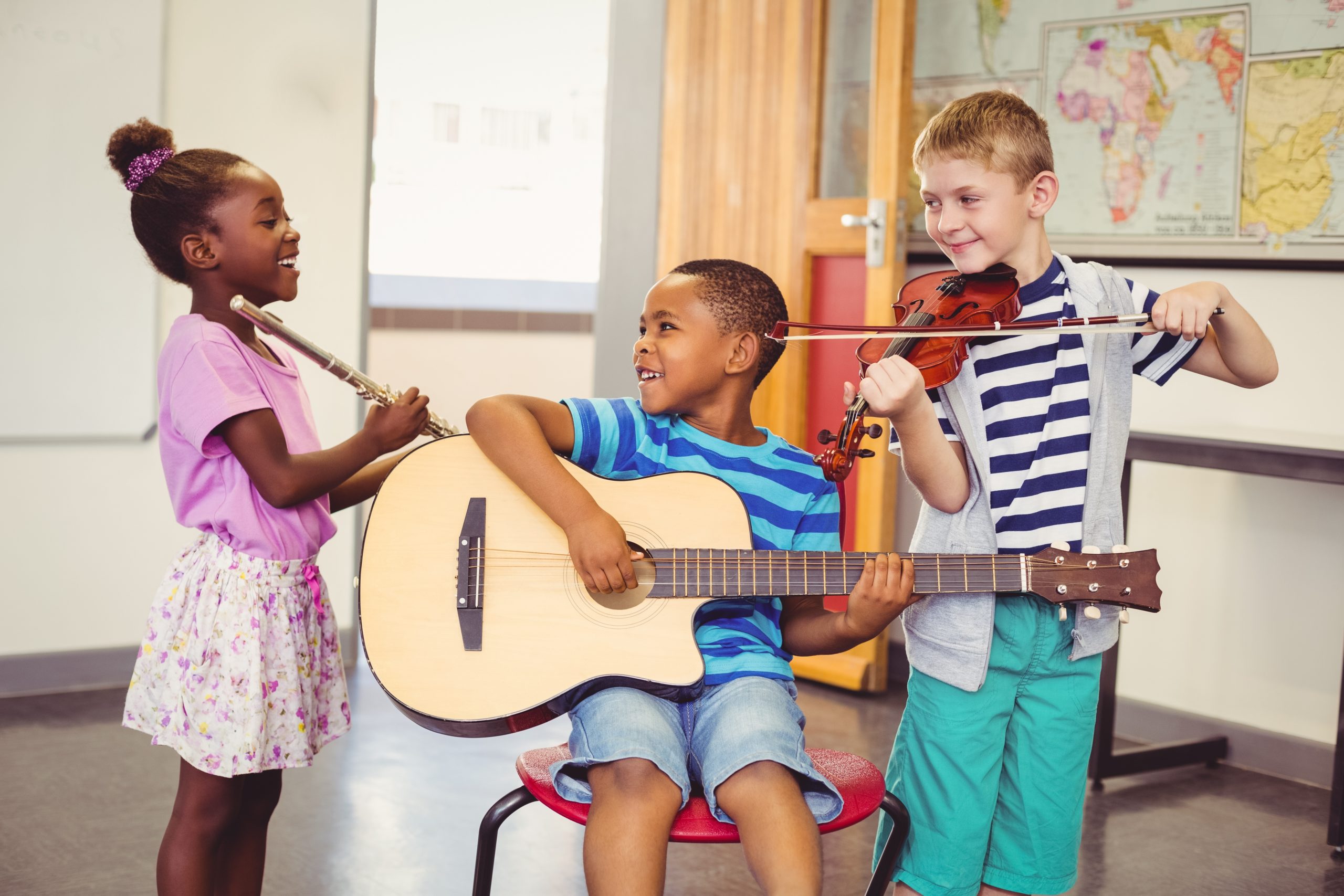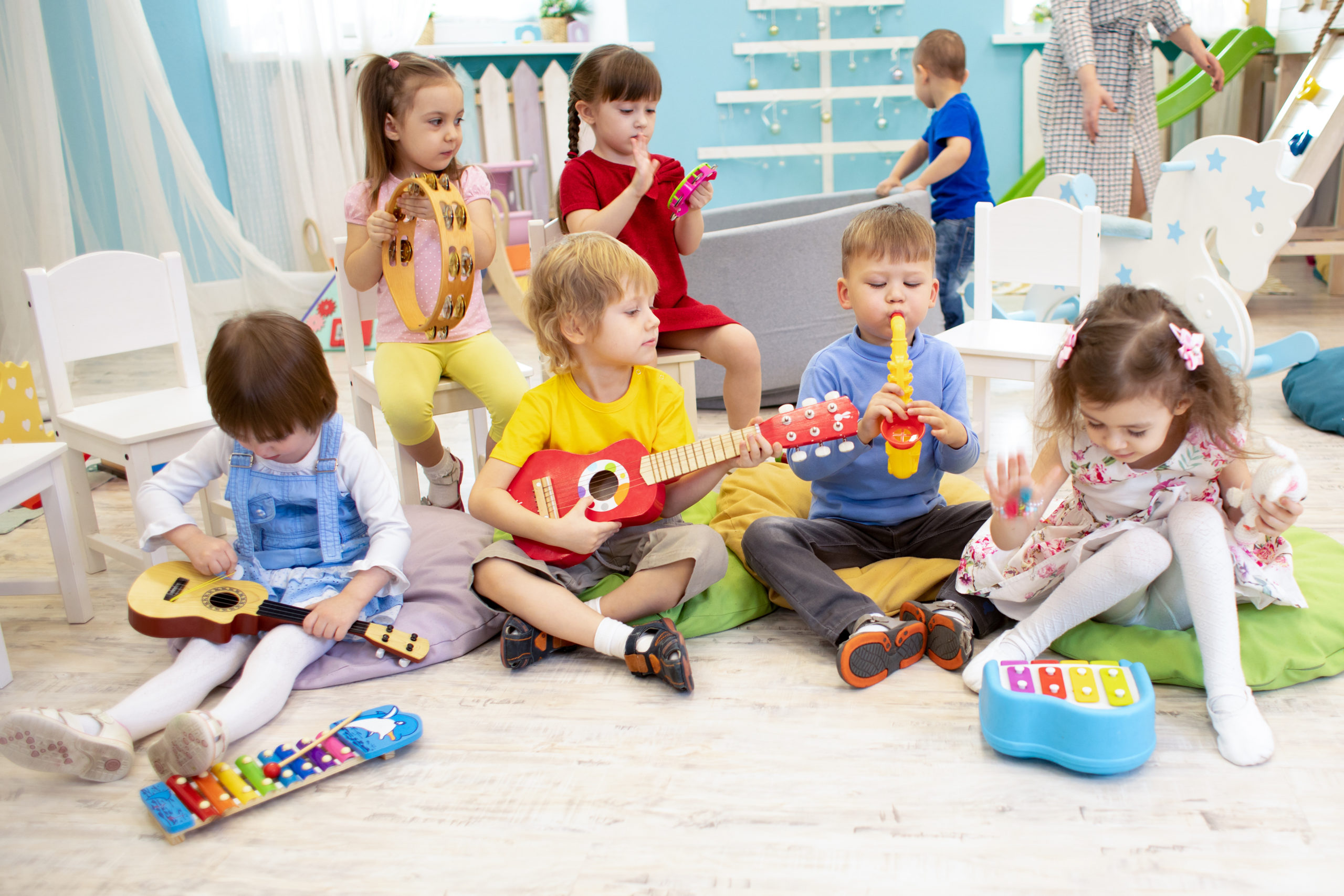Music is a universal experience. No matter what age or what culture, people use music to relate to one another, regulate emotions and form their identities. While it can’t be contested that music plays an important role in humans’ lives, research is also beginning to show us the critical role it plays in children’s language development. In fact, music has been called a language all its own — and one that kids can master before their native language takes shape.
“The rhythmic cadence and tonal changes of music spark an interest in the cadance and tone involved in everyday speech patterns,” says Cheryl Bruemmer, who has been an instructor for the early-childhood music program Kindermusik in Cincinnati for more than 19 years. “Often a child not yet confident in expressive language skills will engage in the repetitive phrases of a song without a similar hesitation.”
Neuroscientists at the Brain and Creativity Institute at University of Southern California are diving into why exactly this is. According to their research, which has been underway since 2012, music instruction speeds up the maturation of auditory pathways in the brain, which can, in turn speed up the development of language, reading and other skills. This is backed up by the research of Christina Zhao, a postdoctoral researcher at University of Washington’s Institute for Learning & Brain Sciences, who says that a child’s exposure to musical patterns can improve their ability to detect and predict speech patterns.
In other words, the parts of the brain that process music and language are closely connected.
As parents, we all want to give our children a head start on learning, and music just might be a fun and easy way to do that. And the good news is, you don’t have to be able to carry a tune yourself. Exposing your child to music can be as simple as turning on your favorite playlist at dinnertime or as involved as enrolling in an early-childhood music class, like Kindermusik or Music Together. However, there are also a number of small, intentional things you can do at home no matter your musical skill level to increase your child’s music competence and feed their developing brain.
Repeat, Repeat, Repeat
If your children ever want to hear the same song over and over and over again, don’t fret–they’re not doing it to annoy you. “Children thrive on repetition and need it to develop confidence,” Bruemmer says.
Repeating the same song over the course of a day or even several weeks can encourage language development, but so can playing songs that have repetitive phrases or sounds. Nursery rhymes are particularly good for this, but some of your favorite music can be, too.
“Just this week, I had a nanny tell me as we were discussing the development of early consonants in infants that when she heard the baby she cares for attempting the “b” sound, she played the oldie by the Beach Boys, “Barbara Ann,” in which the “b” sound is playfully repeated,” Bruemmer says. “Both the baby and older sibs delighted in practicing the sound as they heard the song!”
Experiment With Instruments
While listening to music at home, allow your children to explore its rhythmic patterns by laying out some simple instruments, like drums or shakers, for them to play with. If you don’t have instruments, create your own. Turn a pot and a wooden spoon into a drum and put beans into a plastic container as a rattle. Get curious with your child about the quality of sound those instruments make.
Say Their Name
“Children are more likely to respond to music that is personal,” Bruemmer says. Try incorporating their name or names of family, friends or pets into songs you already know. For example, instead of singing “Mary Had a Little Lamb,” sing “Katie Has a Little Dog.” You can also make up songs about everyday experiences, such as washing dishes or driving in the car, by co-opting familiar tunes or creating your own.
Mix It Up
Get outside of your comfort zone and switch up the type of music you play in the car or at home. Play a mix of rock, classical, jazz, and music from different world cultures. The diversity of genres will expose your child to a variety of meters and tonalities, which will not only help them appreciate a wider breadth of music in the long run but will improve their sensory skills by creating new neural pathways.
Have Fun
Music time should be joyful, and there are so many ways to make music a fun and enriching experience in your home. Have family dance parties to explore musical rhythms. Make up hand motions to your favorite songs to improve vocabulary. Play around with silly sounds to explore the range of the human voice. There is no one way to enjoy music.
Seize opportunities that arise in your everyday life to play and have fun with music, and you’ll be feeding your child’s developing brain with seemingly little effort involved.




